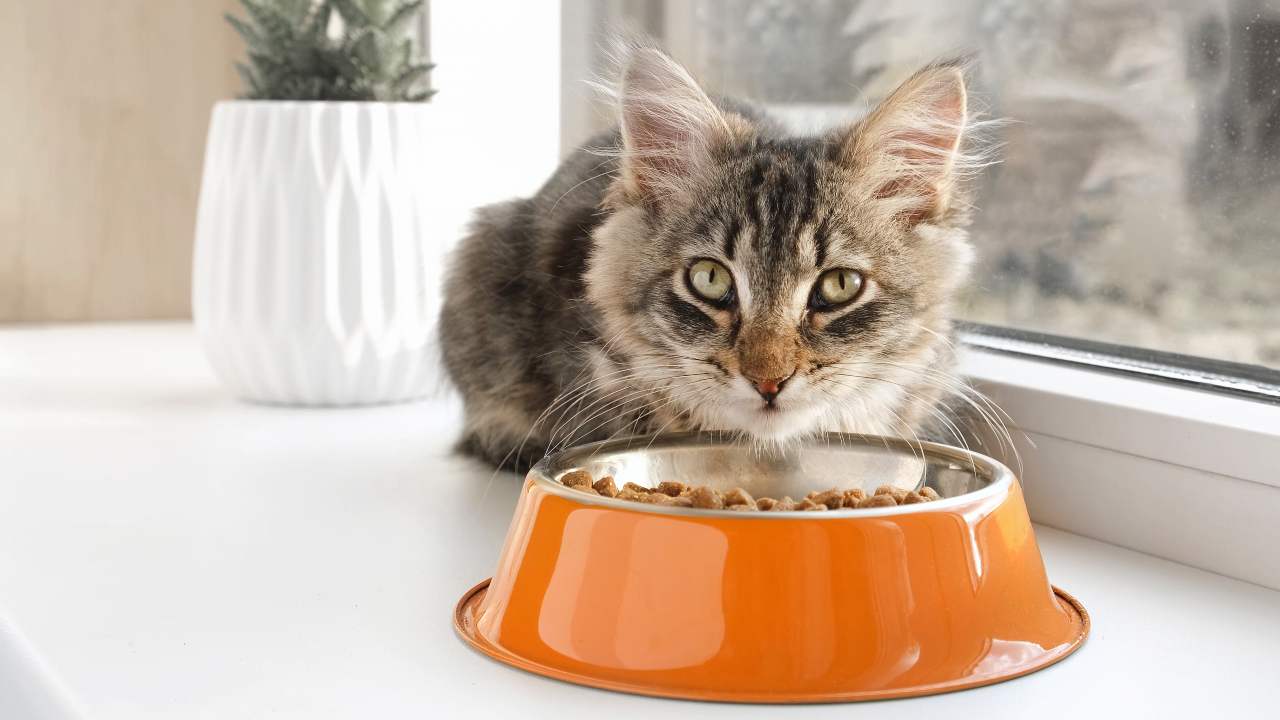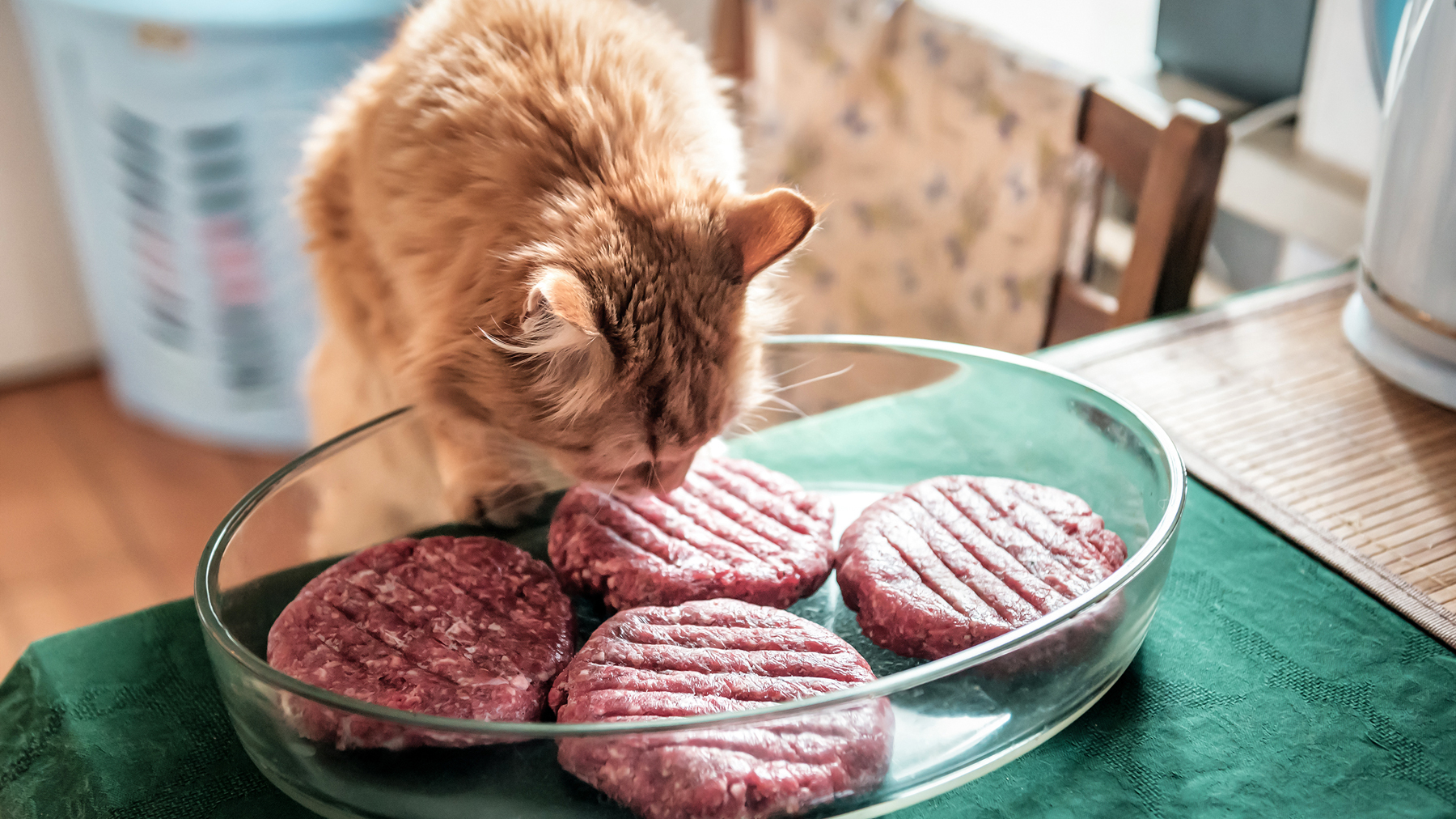Why your cat is stealing food and how to stop him?
Understanding why your cat is stealing food and how to stop him is going to reduce a lot of household frustration

Get the best advice, tips and top tech for your beloved Pets
You are now subscribed
Your newsletter sign-up was successful
Knowing why your cat is stealing food and how to stop it will be beneficial for several reasons. For starters, it’s going to prove far less frustrating for you. It’s also going to be healthier for your moggy because cats aren’t made to eat human food. In some severe cases, it can even be toxic.
When a cat steals food, it also makes it more difficult to control your pet’s portions and that runs the risk of your feline friend becoming obese. Better to get them to stick to the best dry cat food or best wet food and leave the rest for you. The trouble is, with cats having an instinct to hunt, it’s not always going to be easy. But persevere and you’ll help cats to potentially avoid foods high in sugar and fat while even reducing the risk of parasites spreading.
Here we seek the advice of expert veterinarian Dr Joanna Woodnutt.

After graduating as a veterinarian from the University of Nottingham, Dr Joanna Woodnutt went on to practice companion animal medicine in the Midlands, UK. Dr Woodnutt is specifically interested in consulting and helping her clients understand their pets better, whether it’s around medical problems such as dermatology, behavior, and nutrition.
Why do cats steal food?
The answer to this question is much the same as “why does my cat bring me toys and other gifts?” Quite simply because they love to hunt and, in some cats, this instinct is very highly developed. It’s in a cat’s nature to grab anything they can find whether that’s your breakfast toast or a small piece of chicken. In some instances, cats will steal another moggy’s food. But why?
"Cats might steal food because they’re hungry, because they want attention, or because they like your food better than their own so consider whether your cat could be hungry – did you forget to feed them? Have they recently been put on a diet?", Dr Joanna Woodnutt explains. If, however, you believe they are getting enough daily calories, there may be another reason for such theft: illness. Hunger is a sign of common cat conditions such as hyperthyroidism and diabetes and the question, “why is my cat always hungry?” is always worth exploring.
Why is my cat obsessed with human food?
Some cats appear the moment you get the frying pan out and their cries for scraps can be irritating. Your kitty may be simply begging for your attention or wants to be involved, particularly if he’s young or curious. "Some cats eat human food to get attention – even though it’s usually negative attention (telling them off), it’s better than nothing,” says Woodnutt.
But your cat could be displaying dominance and asserting his ‘right’ to what’s on your plate.
Get the best advice, tips and top tech for your beloved Pets
Woodnutt says this most commonly happens because human food is interesting and tastes different from what cats are used to. "The added salt and sugar in our food can make it taste even nicer to cats. The different textures are exciting, too," she explains.
If cats have previously had the chance to sample human food they may have just decided they prefer the taste of it. Some shelter cats who are used to dining from garbage cans decide they simply prefer the human version, while others may have been spoiled by previous owners or regular visitors.
It’s also possible that your cat’s diet isn’t meeting his full nutritional needs, so he’s hanging around your plate instead. Should this be the case, look for the best cat foods and ensure you’re feeding a balanced diet. One thing’s for sure, you need to avoid the 8 human foods that are poisonous to cats!
"Remember, if your cat has stolen human food, it’s important you think about common human foods that are poisonous to cats such as onions, chocolate, and raisins,” warns Woodnutt. “Also consider whether there’s anything physically harmful they could have eaten – like butcher’s string, tin foil, or sharp bones.
How to stop your cat stealing food

You need to stop your cat from stealing food. A balanced feline diet is necessary for weight control and a good nutritional balance and, if your kitty is constantly sneaking snacks you won’t be able to monitor their intake. But what should you do?
- If your cat begs, never feed tidbits and make sure any visitors know that’s the house rule.
- Any food accidentally dropped on the floor should be cleared up immediately.
- Don’t leave food lying around. Some cats are very accomplished thieves and can open cupboards or even boxes.
- Avoid leaving your sink full of dirty dishes – as we know from Garfield, cats have no scruples about sticking their head in lasagne dishes!
- If jumping on tables or worktops is an issue, try putting strips of double-sided sticky tape out to put your kitty off.
- Buy motion-activated sensors that will emit harmless puffs of air when triggered to ‘chase’ cats out of certain areas.
If you’ve inherited a cat with a problem – perhaps you’ve rehomed a cat from an elderly relative, or taken in a shelter cat – then you’ll need to go to greater lengths to retrain him.
Never reward begging behavior with food from the table. You can feed your cat at a similar time to your mealtime so that you can be sure he’s not actually hungry. Cats in the wild prefer small, regular meals and may eat several times a day, so you could try feeding yours three or even four smaller meals during the day.
Another great tool is distraction. Try the best cat toys – perhaps a cat treat ball that means a cat has to work harder for a meal – and, if your cat’s unwanted behavior could be due to boredom, increasing playtimes can help.
How to stop your cat stealing the food of other cats
If you’re feeding several cats together, there’s always a risk that the strongest may steal from the weakest. This may lead to an obese dominant cat and a potentially malnourished ‘under cat’.
The simplest way to solve this one is to feed both cats separately. Get them into a routine where they are fed at the same time every day. Put each cat into a separate room and leave their food down for no more than 30 minutes. They will soon learn that they have only half an hour before food is removed and will clean their bowls quickly. Once mealtimes are over, your cats can socialize again.
How to discipline your cat for stealing food
Your cat is obeying its natural instincts so discipline should only be to break the behavior cycle and not as punishment.
According to Woodnutt, the problem with food stealing is that it’s self-rewarding – your cat will be rewarded for stealing food no matter what you do!
"Try giving your cat positive attention for not stealing food if you think they could be attention-driven. Breaking the habit by keeping food secure in pet-proof containers is also key as this stops the reward,” she says.
"Cats can be trained, just like dogs – try training a ‘leave’ command – rewarding your cat with an amazing treat for leaving the food they’re about to steal and coming to you instead," she advises, "You’ll need to practice with toys and low-value foods long before you catch your cat with a chicken carcass if you want there to be any chance of her listening though!"
As with any learned behavior, stopping your cat from stealing food can take time and patience. This is especially the case if you have inherited the problem and he learned it at a young age! Using some of these techniques including distraction and removing temptation should help to re-educate him, making mealtimes a nicer experience for both of you.
There are other issues around food that you may want to learn more about. Learning what to do with a cat not eating, for example, or working out why a cat won’t eat wet food. You can also learn how to play with a cat to hone your distraction techniques.
Sara is a freelance journalist and copywriter of many years’ experience with a lifelong love of animals. She’s written for a range of magazines and websites on subjects varying from pet care to travel. A horse rider since the age of five, she’s currently a full time pet slave to horse Blue and gorgeous, goofy English Springer Spaniel Olly. Adorable Olly has a huge sense of adventure and no sense of direction, keeping Sara on her toes.
- Jessica DowneyFreelance Writer

